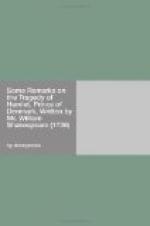Most careful scholars of our day go no further on the question of authorship than to note that the essay has been “attributed” to Hanmer; some, like Professor Stoll, seem to have dropped the idea that Hanmer was in any way connected with it and safely speak of “the author” or “the anonymous author”; I recall only one case in recent years of an all-out, incautious assignment of the authorship to Hanmer ("Hamlet among the Mechanists,” Shakespeare Association Bulletin 17 [July, 1942], 138). It would seem advisable to follow Stoll’s lead and ignore Hanmer entirely.
The anonymous essay has been of continued interest to students of Shakespeare. Echoes of its ideas if not its words appear in such later critics of the eighteenth century as Gentleman, Steevens, Richardson, and Morgann; in 1790 Malone copied out some two pages of the best of it for publication; and in 1864 the whole was reprinted, a not too usual thing for an obscure eighteenth century pamphlet. Present-day students of Shakespeare, among them D.N. Smith, Lounsbury, Babcock, Lawrence, and Stoll have treated the essay with unvarying respect. Remarking that it anticipates some of Johnson’s arguments, Smith calls it in general a “well-written, interesting book” greatly superior to the anonymous essay on Hamlet of 1752 (Eighteenth Century Essays on Shakespeare, xxn). Lawrence has recently praised a selected passage for its “wise words ... which may be pondered with profit” (Hamlet and Fortinbras, PMLA61 [1946], 697). And Stoll, who has obviously read the book with care, has found in one of its statements the very “beginning of historical criticism” (PQ 24 [1945], 291; Shakespeare Studies, 212n.), and has elsewhere seen much to commend in it.
Reasons for such attention are not difficult to find; for the Remarks is both intrinsically and historically an important piece of criticism. It is still worth reading for more than one passage of discerning analysis and apt comment on scene, speech, or character, and for certain not unfruitful excursions into the field of general aesthetics; while historically it is a sort of landmark in Shakespearian literature. Standing chronologically almost midway between Dryden and Johnson, Kames, and Richardson, the Remarks shows decisively the direction in which criticism, under the steadily mounting pressure of liberal, empirical thought, is traveling. This little unpretentious book gathers into itself, either in faint adumbration or in fairly advanced form, the tendencies in method and ideas that are to remake criticism in the eighteenth century. There are reflected here the growing distrust of the “Rules” and the deepening faith in mind as the measure and in imagination as the instrument. There is also added recognition of the integrity of effects as a factor in judging literature.
Anonymous is an earlier member of the School of Taste. He is none-the-less concerned with firm principles by which to justify his acceptances and rejections. His announced over-all rule is conformity to “Reason and Nature”—old words that he uses in the newer way. But he is also handily equipped with a stock of stubbornly conservative principles, reaching at times the status of bias, that serve to hold his taste in balance and effectively check unrestrained admiration.




